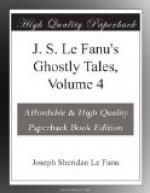The bully rose, wiping the perspiration from his white face with his blood-stained hands, but Ned lay stretched and motionless upon the grass. It was impossible to get him upon his legs for another round. So he was carried down, just as he was, to the pond which then lay close to the old Park gate, and his head and body were washed beside it. Contrary to the belief of all he was not dead. He was carried home, and after some months to a certain extent recovered. But he never held up his head again, and before the year was over he had died of consumption. Nobody could doubt how the disease had been induced, but there was no actual proof to connect the cause and effect, and the ruffian Larkin escaped the vengeance of the law. A strange retribution, however, awaited him.
After the death of Long Ned, he became less quarrelsome than before, but more sullen and reserved. Some said “he took it to heart,” and others, that his conscience was not at ease about it. Be this as it may, however, his health did not suffer by reason of his presumed agitations, nor was his worldly prosperity marred by the blasting curses with which poor Moran’s enraged mother pursued him; on the contrary he had rather risen in the world, and obtained regular and well-remunerated employment from the Chief Secretary’s gardener, at the other side of the Park. He still lived in Chapelizod, whither, on the close of his day’s work, he used to return across the Fifteen Acres.
It was about three years after the catastrophe we have mentioned, and late in the autumn, when, one night, contrary to his habit, he did not appear at the house where he lodged, neither had he been seen anywhere, during the evening, in the village. His hours of return had been so very regular, that his absence excited considerable surprise, though, of course, no actual alarm; and, at the usual hour, the house was closed for the night, and the absent lodger consigned to the mercy of the elements, and the care of his presiding star. Early in the morning, however, he was found lying in a state of utter helplessness upon the slope immediately overlooking the Chapelizod gate. He had been smitten with a paralytic stroke: his right side was dead; and it was many weeks before he had recovered his speech sufficiently to make himself at all understood.
He then made the following relation:—He had been detained, it appeared, later than usual, and darkness had closed before he commenced his homeward walk across the Park. It was a moonlit night, but masses of ragged clouds were slowly drifting across the heavens. He had not encountered a human figure, and no sounds but the softened rush of the wind sweeping through bushes and hollows met his ear. These wild and monotonous sounds, and the utter solitude which surrounded him, did not, however, excite any of those uneasy sensations which are ascribed to superstition, although he said he did feel depressed, or, in his own phraseology, “lonesome.” Just




